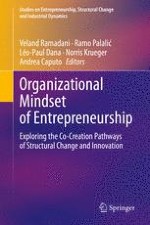2020 | OriginalPaper | Buchkapitel
Exploring the Effects of Learning Organization on Innovative Work Behaviors of White-Collar Workers: Sample from Turkey
verfasst von : Biçer Mehmet
Erschienen in: Organizational Mindset of Entrepreneurship
Verlag: Springer International Publishing
Aktivieren Sie unsere intelligente Suche, um passende Fachinhalte oder Patente zu finden.
Wählen Sie Textabschnitte aus um mit Künstlicher Intelligenz passenden Patente zu finden. powered by
Markieren Sie Textabschnitte, um KI-gestützt weitere passende Inhalte zu finden. powered by
